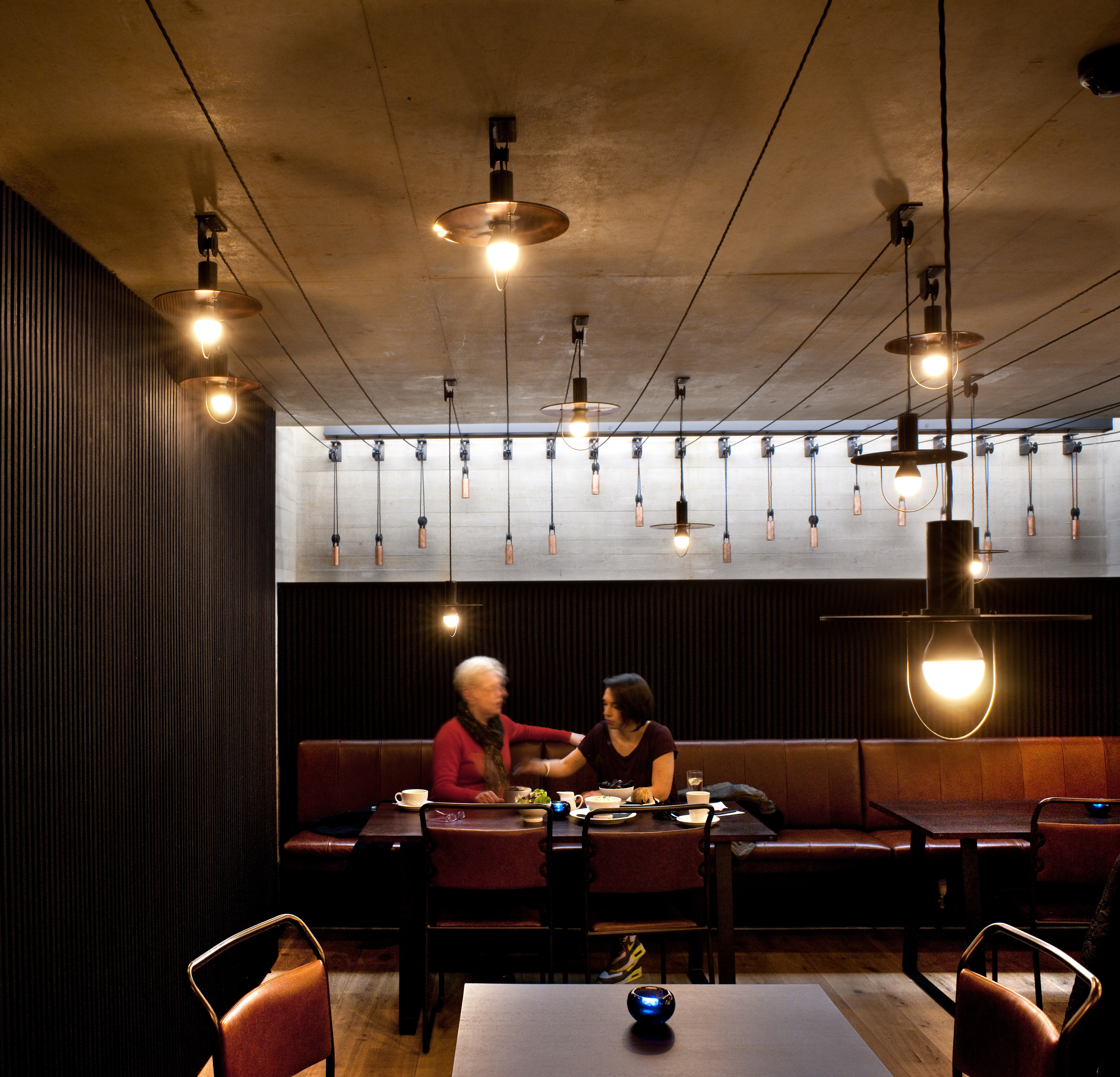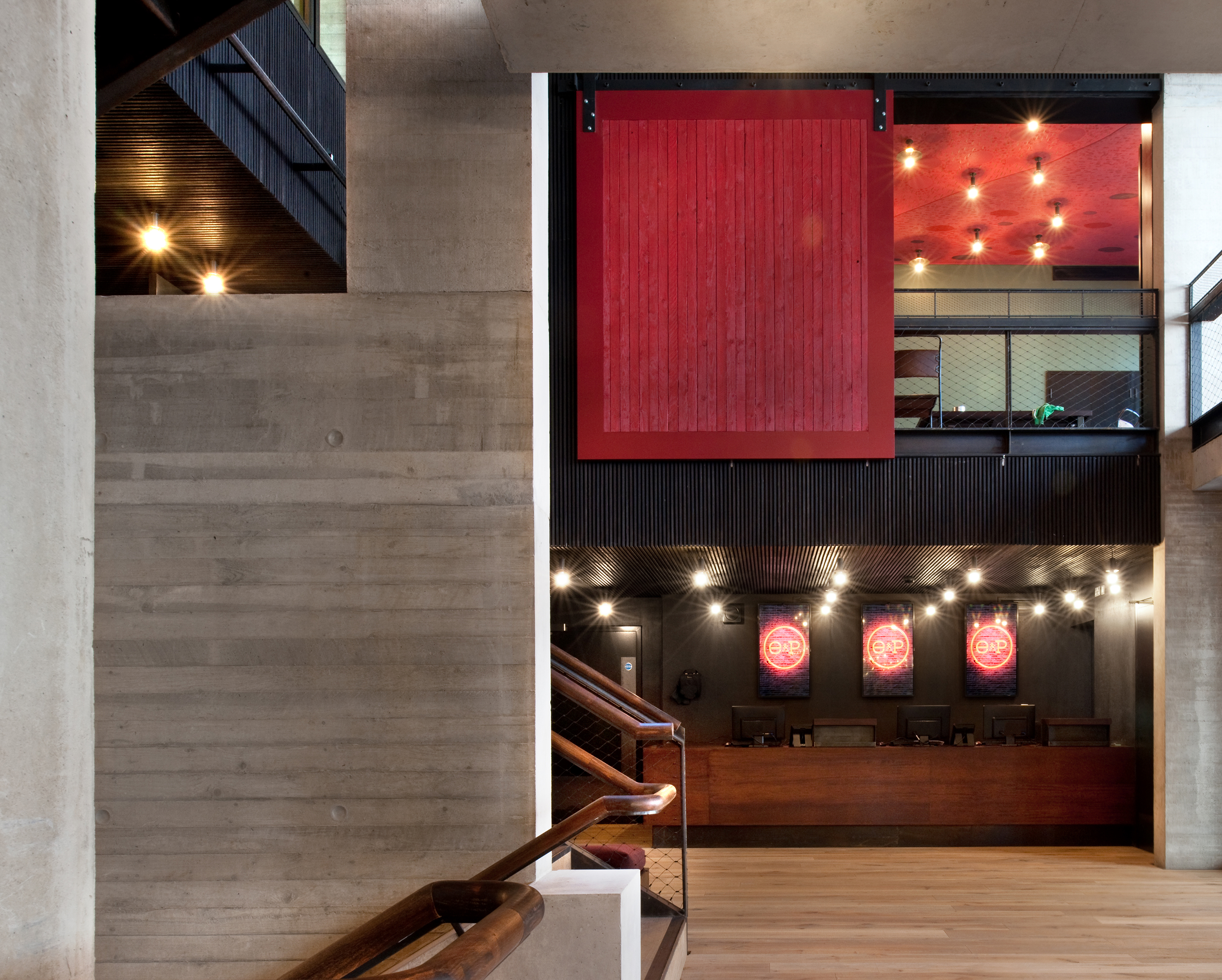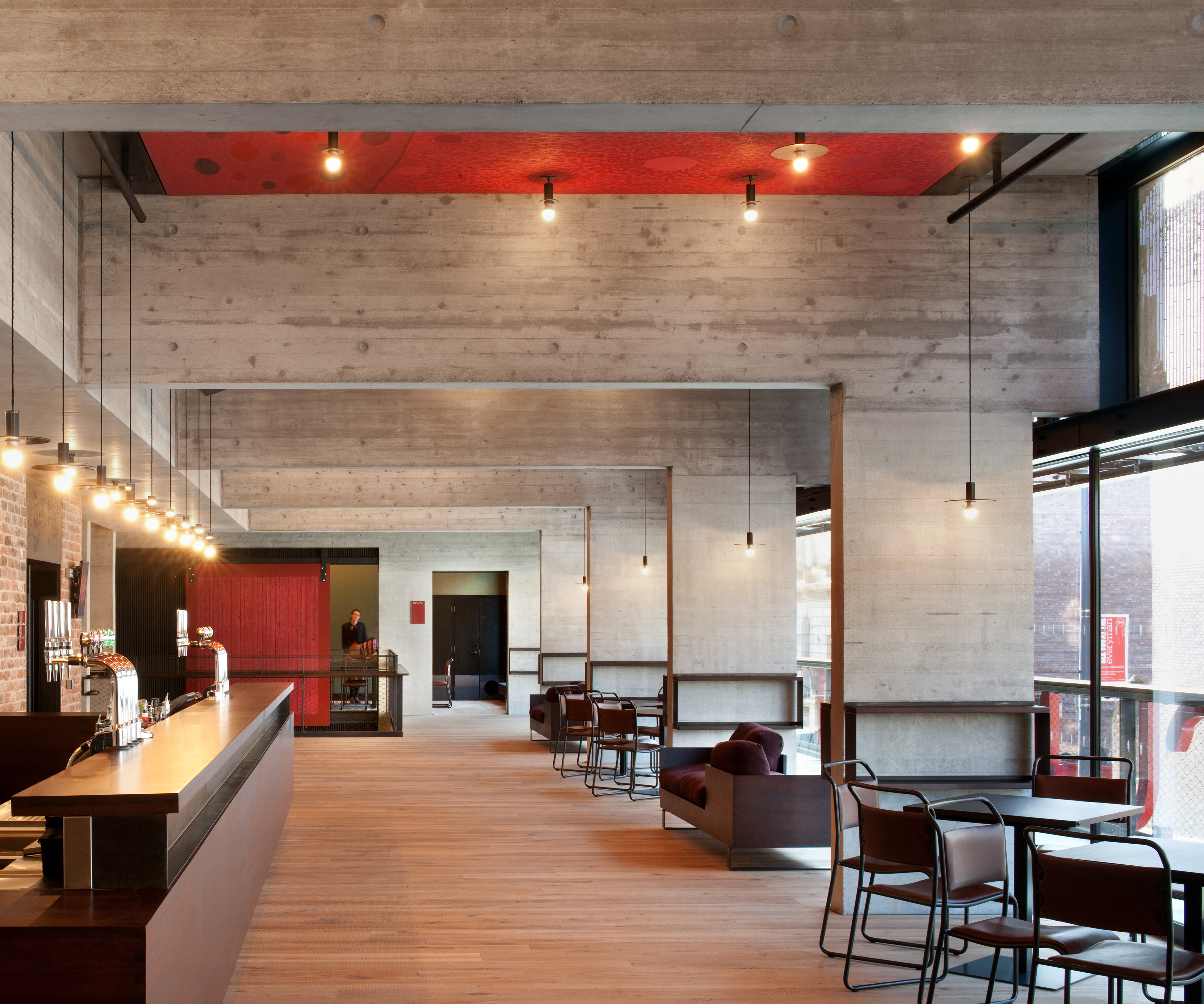The new Everyman Theatre in Liverpool by Haworth Tompkins has won the coveted RIBA Stirling Prize 2014 for the best building of the year. Now in its 19th year, the RIBA Stirling Prize is the UK’s most prestigious architecture prize.
The presentation of the RIBA Stirling Prize trophy to Haworth Tompkins took place at a special ceremony on October 16 at the Royal Institute of British Architects in London.
The old Everyman Theatre in Liverpool opened in 1964 in the shell of a 19th-century chapel on one of Liverpool’s main streets. Although a much-loved institution, the building itself was in a state of disrepair.
The decision to pull the theater down and replace it with a new one has been a nine-year project for the architects Haworth Tompkins. They have expertly met a difficult challenge: that of creating an entirely new and sustainable building, while retaining and revitalizing the best-loved features of its predecessor.
The architects were tasked with ensuring that the soul of the old Everyman, one of informality and community ownership—the "theatre of the people"—was carried into the new building. The result is a new building with a striking exterior and elegant interior, all with exceptional attention to detail and sustainability credentials.
RIBA President Stephen Hodder said:
“The success of this exceptional new building lies in the architect’s close involvement with the local community throughout the project. Haworth Tompkins have struck the perfect balance between continuity and change to win the hearts and minds of the people of Liverpool with the vibrant new Everyman. Complementing beautifully with the surrounding listed buildings, it is a ground-breaking example of how to build a daring bold and highly sustainable large public building in a historic city centre. The building exceeds expectations and I am delighted to present Haworth Tompkins with the 2014 RIBA Stirling Prize.”
The judges' citation for the RIBA Stirling Prize winner:
“The new Everyman in Liverpool is truly for every man, woman, and child. It cleverly resolves so many of the issues architects face every day. Its context—the handsome street that links the two cathedrals—is brilliantly complemented by the building’s scale, transparency, materials, and quirky sense of humour, notably where the solar shading is transformed into a parade of Liverpudlians. The ambience of the theatre is hugely welcoming with three elegant and accessible public foyers for bars, lounges and café/bistro. Clever use of materials with interlocking spaces and brilliant lighting make this an instantly enjoyable new public space for the city."
"It is exceptionally sustainable; not only did the construction re-use 90% of the material from the old theater, but all spaces are naturally ventilated including the auditorium with its 440 seats. Clever, out of sight concrete labyrinths supply and expel air while maintaining total acoustic isolation. It is one of the first naturally ventilated auditoria in the UK. The generosity of its public spaces, which, on a tight site, are unexpected and delightful, are used throughout the day and night. As Howarth Tompkins’ first completely new theatre, it is a culmination of their many explorations into the theatre of the 21st century. It is ground-breaking as a truly public building, which was at the heart of the client’s philosophy and ethos. In summary, an extraordinary contribution to both theatre and the city, achieved through clever team working—client, architect, consultants, and contractor—where the new truly celebrates the past.”
This is the first time Haworth Tompkins has won the RIBA Stirling Prize. The firm was previously shortlisted in 2007 for London’s Young Vic theatre. The Everyman is its first new-build theater, among a portfolio of over a dozen theaters from the Royal Court in 2000 to the recent temporary "Shed" outside the National Theatre. Its other projects include a secondary school in Birmingham and Coin Street Community Centre in London. The practice is currently working on a regeneration project in Canning Town and a housing development in Stratford, East London.
The Everyman Theatre was chosen by the judges from the following outstanding shortlisted entries:
-
Library of Birmingham by Mecanoo
-
London Aquatics Centre by Zaha Hadid Architects
-
London School of Economics - Saw Swee Hock Student Centre by O’Donnell + Tuomey Architects
-
Manchester School of Art by Feilden Clegg Bradley Studios
-
The Shard by Renzo Piano Building Workshop
The judges for the 2014 RIBA Stirling Prize were: Spencer de Grey (Chair) - architect, Foster and Partners; MJ Long - architect, Long and Kentish Architects; Cindy Walters - architect, Walters and Cohen; Stephen Kieran – architect, Kieran Timberlake; and Sir Timothy Sainsbury architectural patron and client.
The winners of three other annual RIBA awards were also announced:
-
Stormy Castle, Gower Peninsula, Wales, by Loyn & Co., won the 2014 RIBA Manser Medal for the best new private home
-
House No 7, Isle of Tiree, Scotland, by Denizen Works won the RIBA’s 2014 Stephen Lawrence Prize for best project with a construction budget of less than £1 million
-
Manchester Metropolitan University won the 2014 RIBA Client of the Year. The award recognizes the role good clients play in the delivery of fine architecture.
Related Stories
Windows and Doors | Mar 5, 2023
2022 North American Fenestration Standard released
The 2022 edition of AAMA/WDMA/CSA 101/I.S.2/A440, “North American Fenestration Standard/Specification for windows, doors, and skylights” (NAFS) has been published. The updated 2022 standard replaces the 2017 edition, part of a continued evolution of the standard to improve harmonization across North America, according to a news release.
AEC Innovators | Mar 3, 2023
Meet BD+C's 2023 AEC Innovators
More than ever, AEC firms and their suppliers are wedding innovation with corporate responsibility. How they are addressing climate change usually gets the headlines. But as the following articles in our AEC Innovators package chronicle, companies are attempting to make an impact as well on the integrity of their supply chains, the reduction of construction waste, and answering calls for more affordable housing and homeless shelters. As often as not, these companies are partnering with municipalities and nonprofit interest groups to help guide their production.
Modular Building | Mar 3, 2023
Pallet Shelter is fighting homelessness, one person and modular pod at a time
Everett, Wash.-based Pallet Inc. helped the City of Burlington, Vt., turn a municipal parking lot into an emergency shelter community, complete with 30 modular “sleeping cabins” for the homeless.
Codes | Mar 2, 2023
Biden Administration’s proposed building materials rules increase domestic requirements
The Biden Administration’s proposal on building materials rules used on federal construction and federally funded state and local buildings would significantly boost the made-in-America mandate. In the past, products could qualify as domestically made if at least 55% of the value of their components were from the U.S.
Industry Research | Mar 2, 2023
Watch: Findings from Gensler's latest workplace survey of 2,000 office workers
Gensler's Janet Pogue McLaurin discusses the findings in the firm's 2022 Workplace Survey, based on responses from more than 2,000 workers in 10 industry sectors.
AEC Innovators | Mar 2, 2023
Turner Construction extends its ESG commitment to thwarting forced labor in its supply chain
Turner Construction joins a growing AEC industry movement, inspired by the Design for Freedom initiative, to eliminate forced labor and child labor from the production and distribution of building products.
Multifamily Housing | Mar 1, 2023
Multifamily construction startup Cassette takes a different approach to modular building
Prefabricated modular design and construction have made notable inroads into such sectors as industrial, residential, hospitality and, more recently, office and healthcare. But Dafna Kaplan thinks that what’s held back the modular building industry from even greater market penetration has been suppliers’ insistence that they do everything: design, manufacture, logistics, land prep, assembly, even onsite construction. Kaplan is CEO and Founder of Cassette, a Los Angeles-based modular building startup.
Airports | Feb 28, 2023
Data visualization: $1 billion earmarked for 2023 airport construction projects
Ninety-nine airports across 47 states and two territories are set to share nearly $1 billion in funding in 2023 from the Federal Aviation Administration. The funding is aimed at help airports of all sizes meet growing air travel demand, with upgrades like larger security checkpoints and more reliable and faster baggage systems.
Seismic Design | Feb 27, 2023
Turkey earthquakes provide lessons for California
Two recent deadly earthquakes in Turkey and Syria offer lessons regarding construction practices and codes for California. Lax building standards were blamed for much of the devastation, including well over 35,000 dead and countless building collapses.
Sports and Recreational Facilities | Feb 27, 2023
New 20,000-seat soccer stadium will anchor neighborhood development in Indianapolis
A new 20,000-seat soccer stadium for United Soccer League’s Indy Eleven will be the centerpiece of a major neighborhood development in Indianapolis. The development will transform the southwest quadrant of downtown Indianapolis by adding more than 600 apartments, 205,000 sf of office space, 197,000 sf for retail space and restaurants, parking garages, a hotel, and public plazas with green space.























